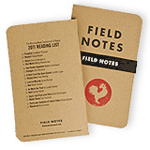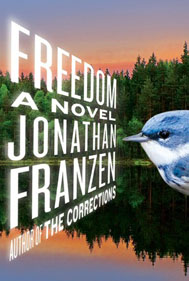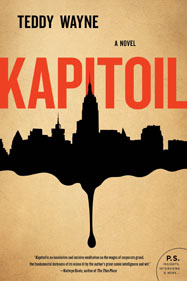-
March 8, 2011
Opening Round
-
Commentary by
Kevin Guilfoile & John Warner
-
Today’s Winner:
1Freedom
John: My objectivity is compromised here. I’ve worked with Teddy Wayne extensively in my editorial capacity at McSweeney’s Internet Tendency. He even thanks me in the acknowledgements in the back of his book. It isn’t too far off to say that in some sense, I made Teddy Wayne, particularly because I formed his body out of clay and then breathed life into him.
Plus, Jonathan Franzen once insulted my dog.
OK, only some of the above is true, but what I can say is that I’m a fan of both of these books, as is Jonathan Franzen, since he wrote one and blurbed the other:
[Karim]’s a type—the nerdy and needy young immigrant—that we’re all familiar with but that no other writer, as far as I know, has invented such a funny and compelling voice and story for…it does what novels can do better than any other art form: Show us a familiar world through unfamiliar eyes.
Freedom is a polarizing book, with more one-star than five-star reviews at Amazon, with many of the one-star reviews declaring that it “doesn’t live up to the hype.” Having hype for one’s book to not live up to is what you might call a “high-class problem,” since most books disappear without ever having the chance to be hated.
 Buy anything from Field Notes from now until the end of the ToB and receive a special “reading list” memo book free, while they last. Use coupon code ROOSTER.
Buy anything from Field Notes from now until the end of the ToB and receive a special “reading list” memo book free, while they last. Use coupon code ROOSTER.Kevin: A few years back I saw a review for a book (not even a massively hyped book like Freedom) in which the critic said all sorts of kind things about the story and the characters and the writing. Then in the last sentence he summed up with, “So while [title] might not be the greatest book ever written, it’s well worth your time.” And I remember laughing out loud—is this really the standard we’re supposed to apply to every novel? Does this reviewer sign off every review that way? Even now I sometimes wonder if he ever found the book he was looking for.
But especially since the Time magazine cover, you really feel like this is exactly what Jonathan Franzen is up against. If a person feels inclined to give her opinion about this novel, it’s not enough to say that she liked it because, well, why bother? So many people had shoveled so many superlatives at Freedom before it was even published that your amateur opinion maker either has to confirm for you that it’s the Great American Novel or tell you why it fails to be the Great American Novel. G.A.N. or meh. Those are the options available to your typical Amazon reviewer.
John: I think the polarizing nature of Freedom and the big Time magazine/Oprah Book Club-sized target on its back makes it a dubious bet to make it all the way to the prize. Clearly, though, Sarah Manguso was won over, giving it a comfortable margin over Kapitoil.
I do think she correctly identifies Kapitoil’s chief virtue, which is its pace. Sometimes I feel like “plot” is a dirty word in literary fiction, but I dig it, and I think most readers do too, considering how many of our finalists this year rocket along at a good clip without sacrificing the pleasures of language and character, and I definitely include Kapitoil in this bunch.
Manguso identifies what she feels is an over-reliance on conceits in Kapitoil, or at least not enough working well other than the conceits, but I’m going to take issue from the booth with one of the conceits she says she identifies, Karim’s so-called place on the autism spectrum. He is a geek, no doubt, but at no point does he seem to shy away or misunderstand human emotional connections and interactions for anything other than reasons of cultural difference.
And really, is there a novel with more conceits than Freedom? Patty’s “autobiography” is perhaps the biggest one, and in terms of the internal integrity of the book, it’s problematic, given that it’s clearly written in Franzen’s, rather than Patty’s, voice.
Kevin: Patty’s telling of her own story does seem entirely unnecessary until the actual stack of paper that makes up her autobiography makes an appearance in the novel. That was well done. And frankly Patty is the best thing in the book for my 28 bucks. If we’re going to pick at Freedom’s weakness I’d say it’s Walter, a character the book keeps telling us is beloved by everyone even though he possesses no belove-able characteristics whatsoever. The amount of time in the last act the reader spends with Walter and Lalitha—an exotic, intelligent, loyal, pathologically submissive, and enormously large-breasted male fantasy object who, like everyone else in the novel, is inexplicably obsessed with what Walter thinks of her—is fairly exasperating. But Freedom is a big book and big novels are messy (all novels are messy but big ones especially so) and I much enjoyed it. Franzen creates a very big world here and there is great pleasure in entering a fictional universe that large. This is unmistakably realism, but because Franzen observes everything so closely the world of the novel is some heightened version of our own, and the pleasure of reading is somehow distantly related to the pleasures of reading a fantasy epic. There’s an escapist element to it.
John: Patty was also my favorite character, and in fact, she’s written with far more sensitivity than any of the male cast. I could maybe make some kind of observation about Franzen’s self-loathing as occasionally displayed in his essays being worked out in his male characters, but I don’t want to get all Freudian so early in the tourney.
At his heart, Franzen is indeed a realist of the oldest school, which is one of the reasons why the book is so pleasurable once we can get past the hype baggage. Franzen’s solution to the problem of post-modernism is to kind of pretend it doesn’t exist, asking us to overlook things like Lalitha’s “perfection” or Patty’s unlikely skill with prose. And for the most part, it works great, but every so often, there’s some moment of tension between the world Franzen’s trying to conjure, and the world as it is (or appears to be), and I was pulled out from under its spell. Lalitha is a great example, a character stretched almost to cartoon, that makes sense in a book that wears its knowingness on its sleeve, where there’s a wink and a nudge from the author that he’s playing with the older man/younger woman, high-achieving immigrant, big bra’d clichés, but Freedom wants us to take her at face value, and well, I forgive it for that because of its other virtues, but I can’t pretend it doesn’t exist.
As involved as I was with Freedom while reading it, some months later, I’m hard-pressed to recall anything about it. It’s strange to think about the experience of such a big book being fleeting, but that’s how it felt for me.
Not that there’s anything wrong with that. Like you say, not every book is the greatest novel ever written. In the end, though, Karim Issar has lingered much longer than anyone from Franzen’s novel.
Kevin: I shouldn’t let this match go without saying that I also enjoyed Kapitoil much more than Judge Manguso did. I found Karim to be a really enjoyable companion, and I laughed a lot at his context-less MBA-speak. The pages flew by. Some conceits just work on me, and this one did. It’s a very assured and funny novel.
Taken as a whole, in fact, this is probably the funniest group of novels we’ve ever had in the ToB. At least five of them could probably be described as outright “comic novels” and many others, including Freedom, can be quite funny. And here’s where I’m tempted to dash off some thoughts about Freedom and a favorite topic of yours and mine, irony, but maybe we’ll save that discussion for the quarterfinals.
Kevin Guilfoile is the author of two acclaimed novels, Cast of Shadows and The Thousand, which have been translated into more than 20 languages.
John Warner’s novel, The Funny Man, will be released late September of this year by Soho Press. For the time being, he teaches at Clemson University.

















